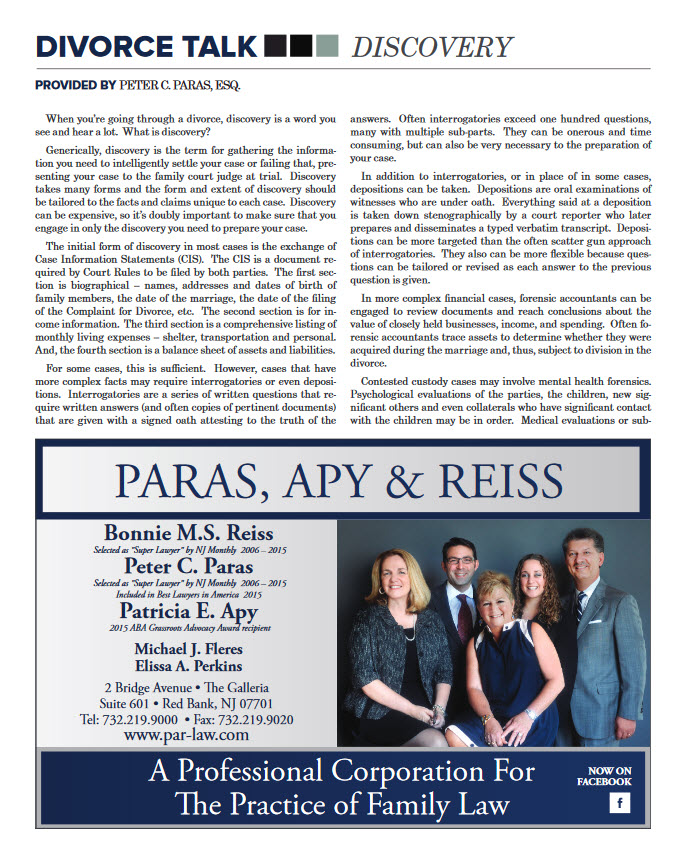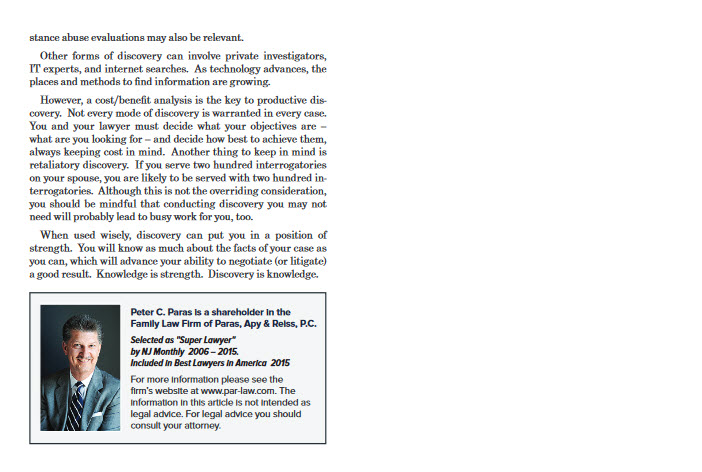When you’re going through a divorce, discovery is a word you see and hear a lot. What is discovery?
Generically, discovery is the term for gathering the information you need to intelligently settle your case or failing that, presenting your case to the family court judge at trial. Discovery takes many forms and the form and extent of discovery should be tailored to the facts and claims unique to each case. Discovery can be expensive, so it’s doubly important to make sure that you engage in only the discovery you need to prepare your case.
The initial form of discovery in most cases is the exchange of Case Information Statements (CIS). The CIS is a document required by Court Rules to be filed by both parties. The first section is biographical – names, addresses and dates of birth of family members, the date of the marriage, the date of the filing of the Complaint for Divorce, etc. The second section is for income information. The third section is a comprehensive listing of monthly living expenses – shelter, transportation and personal. And, the fourth section is a balance sheet of assets and liabilities.
For some cases, this is sufficient. However, cases that have more complex facts may require interrogatories or even depositions. Interrogatories are a series of written questions that require written answers (and often copies of pertinent documents) that are given with a signed oath attesting to the truth of the
answers. Often interrogatories exceed one hundred questions, many with multiple sub-parts. They can be onerous and time consuming, but can also be very necessary to the preparation of your case.
In addition to interrogatories, or in place of in some cases, depositions can be taken. Depositions are oral examinations of witnesses who are under oath. Everything said at a deposition is taken down stenographically by a court reporter who later prepares and disseminates a typed verbatim transcript. Depositions can be more targeted than the often scatter gun approach of interrogatories. They also can be more flexible because questions can be tailored or revised as each answer to the previous question is given.
In more complex financial cases, forensic accountants can be engaged to review documents and reach conclusions about the value of closely held businesses, income, and spending. Often forensic accountants trace assets to determine whether they were acquired during the marriage and, thus, subject to division in the divorce.
Contested custody cases may involve mental health forensics. Psychological evaluations of the parties, the children, new significant others and even collaterals who have significant contact with the children may be in order. Medical evaluations or sub stance abuse evaluations may also be relevant.
Other forms of discovery can involve private investigators, IT experts, and internet searches. As technology advances, the places and methods to find information are growing.
However, a cost/benefit analysis is the key to productive discovery. Not every mode of discovery is warranted in every case. You and your lawyer must decide what your objectives are – what are you looking for – and decide how best to achieve them, always keeping cost in mind. Another thing to keep in mind is retaliatory discovery. If you serve two hundred interrogatories on your spouse, you are likely to be served with two hundred interrogatories. Although this is not the overriding consideration, you should be mindful that conducting discovery you may not need will probably lead to busy work for you, too.
When used wisely, discovery can put you in a position of strength. You will know as much about the facts of your case as you can, which will advance your ability to negotiate (or litigate) a good result. Knowledge is strength. Discovery is knowledge


